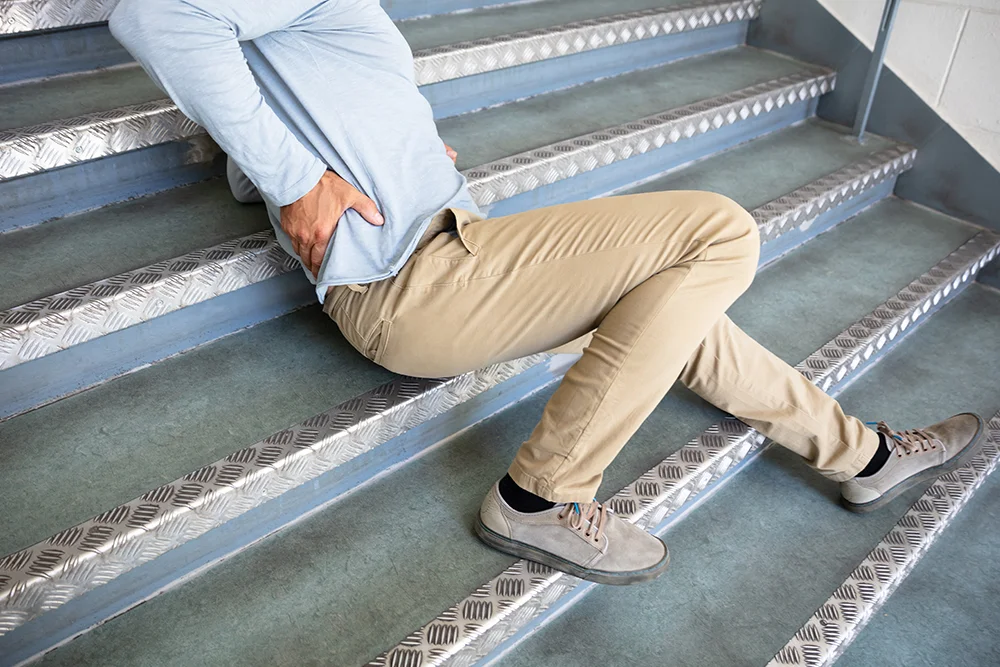Slip and fall accidents are common and can result in serious injuries, from broken bones to head trauma. If you’ve been injured in a slip and fall, you may be wondering, “Who is responsible for my injury?” One of the most important components of a slip and fall case is determining culpability. Determining who is liable is key for obtaining compensation for your medical expenses, missed income, suffering, and more. But figuring out who is liable isn’t always straightforward.
At Butwinick Injury Law, our experienced slip and fall attorneys can help you identify who is at fault and guide you through the legal process to seek fair compensation.
Understanding Liability in a Slip and Fall Case
Liability in a slip and fall accident usually falls on the property owner or manager. They are expected to maintain a reasonably safe environment for visitors, tenants, or customers. However, whether a property owner is liable for your accident depends on several factors.
Here are the key elements that determine liability in a slip and fall case:
- Duty of Care Property owners are legally obligated to keep their premises safe for anyone who visits. This is known as the “duty of care.” Whether you’re in a store, on a sidewalk, or at someone’s home, the property owner or occupier must take reasonable steps to ensure there are no hazards that could lead to a slip and fall.
- Negligence To establish liability, you must prove that the property owner was negligent. This means showing that the owner failed to take appropriate action to fix or warn you about a dangerous condition. For example, if there was a spill in a grocery store aisle that wasn’t cleaned up promptly, and you slipped on it, the store could be held liable.
- Knowledge of the Hazard One of the most important questions in a slip and fall case is whether the property owner knew (or should have known) about the dangerous condition. You’ll need to demonstrate that the owner or an employee was aware of the hazard but failed to address it in a timely manner. For instance, if a business owner knows about a leaky roof but doesn’t fix it, and the wet floor causes someone to slip, they can be held responsible.
- Your Role in the Accident Sometimes, a slip and fall accident isn’t solely the fault of the property owner. You may also share some responsibility. If you were distracted (e.g., texting while walking) or ignored warning signs about a hazard, your compensation might be reduced. This is known as comparative negligence, where the amount you can recover depends on the degree of fault assigned to you.
Who Can Be Held Liable in a Slip and Fall?
Liability in a slip and fall case often extends beyond just the property owner. Here are some parties that may be held responsible:
- Property Owners If the accident occurred on someone’s private property, such as a home, the homeowner could be held liable for not maintaining safe conditions. In commercial properties, the business owner or corporation may be responsible for ensuring the safety of customers and employees.
- Landlords and Property Managers If you live in a rental property, the landlord or property manager has a duty to keep the premises safe for tenants and visitors. If your slip and fall was due to poor maintenance, such as broken stairs or slippery walkways, the landlord could be held liable.
- Businesses Retail stores, restaurants, and other businesses have a legal obligation to ensure their premises are safe for customers. If a business fails to promptly clean up spills, repair uneven flooring, or maintain proper lighting, they may be held responsible for your injuries.
- Government Entities If your accident occurred on public property, such as a sidewalk or in a government building, a city or municipality might be liable. However, cases involving government property are often more complicated due to specific legal rules and shorter time frames for filing a claim. Working with experienced slip and fall attorneys like those at Butwinick Injury Law is essential to navigating these cases.
How Slip and Fall Attorneys Can Help You
Navigating a slip and fall case can be complex, especially when it comes to proving liability. Having a skilled attorney on your side can make all the difference in ensuring you receive the compensation you deserve.
Here’s how Butwinick Injury Law can help:
- Investigating the Accident Our attorneys will thoroughly investigate the circumstances of your slip and fall accident. This includes gathering evidence, such as security footage, witness statements, and maintenance records, to prove that the property owner was negligent.
- Proving Liability Proving liability can be difficult, especially when the property owner denies responsibility. We will work to demonstrate that the owner knew or should have known about the hazardous condition and failed to address it.
- Negotiating with Insurance Companies Insurance companies often try to minimize their payouts. Our team will negotiate with the property owner’s insurance company to secure a fair settlement that covers your medical bills, lost wages, and other damages.
- Litigating the Case If a fair settlement cannot be reached, our attorneys are prepared to take your case to court. We will fight for your rights to ensure you receive full compensation for your injuries.
Conclusion
Determining who is liable in a slip and fall accident depends on factors like duty of care, negligence, and whether the property owner was aware of the hazard. At Butwinick Injury Law, we have the experience and knowledge to help you navigate these complex cases. Our slip and fall attorneys are committed to fighting for the compensation you deserve, whether through settlement negotiations or in court.If you’ve been injured in a slip and fall accident, contact Butwinick Injury Law today for a free consultation. We’re here to help you understand your rights and take action.

